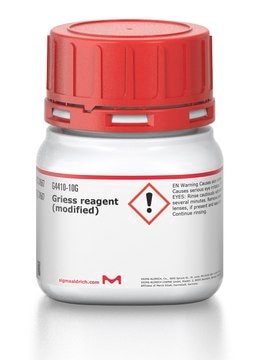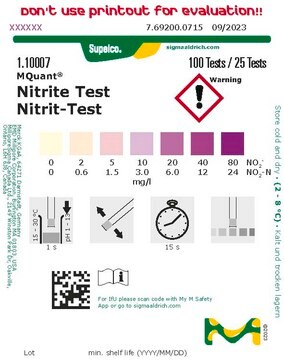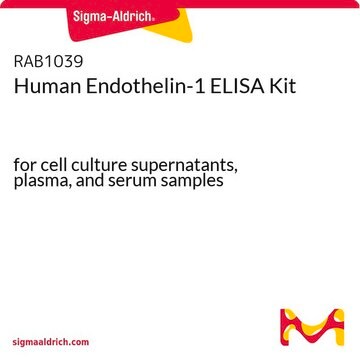23479
Nitrite/Nitrate Assay Kit, colorimetric
used for detection of nitric oxide metabolites
Synonym(s):
Nitrate/Nitrite Assay Kit, colorimetric
Sign Into View Organizational & Contract Pricing
All Photos(1)
About This Item
UNSPSC Code:
12161503
NACRES:
NA.84
Recommended Products
usage
sufficient for 100 assays
suitability
passes test for application
storage temp.
2-8°C
Related Categories
Application
Nitric oxide (NO), a gaseous paramagnetic radical, is a very important and versatile messenger in biological systems. NO is synthesized from L-arginine by NO synthase (NOS). It has been identified as an endothelial derived relaxation factor (EDRF) and antiplatelet substance. It serves as a neurotransmitter derived from a neutrophile and a cytotoxic substance from an activated macrophage. Although NO′s molecular action in the biological system is very versatile, the most important role of NO is the activation of guanylate cyclase.
The Griess assay is one of the most popular and simplest methods used to detect the NO concentration. The Griess assay′s mechanism is summarized as the azo coupling between diazonium species, which are produced from sulfanilamide with NO2, and naphthylethylenediamine. The NO2/NO3 Assay Kit contains these dyes, a nitrate reductase, an enzyme co-factor, buffer solution and NO2, NO3 solutions as standards. Therefore, total NO metabolites are easily detectable using this kit. The suitable NO2 detection range is from 10 to 100 μM.
The Griess assay is one of the most popular and simplest methods used to detect the NO concentration. The Griess assay′s mechanism is summarized as the azo coupling between diazonium species, which are produced from sulfanilamide with NO2, and naphthylethylenediamine. The NO2/NO3 Assay Kit contains these dyes, a nitrate reductase, an enzyme co-factor, buffer solution and NO2, NO3 solutions as standards. Therefore, total NO metabolites are easily detectable using this kit. The suitable NO2 detection range is from 10 to 100 μM.
Kit Components Only
Product No.
Description
- NaNO2 Standard Solution (100 mM) 1 bottle
- NaNO3 Standard Solution (100 mM) 1 bottle
- Buffer solution (20 mM, pH 7.6) 1 bottle
- Nitrate reductase (lyophilized) 1 bottle
- Enzyme Co-factor (lyophilized) 1 bottle
- Griess Reagent A 1 bottle
- Griess Reagent B 1 bottle
Related product
Product No.
Description
Pricing
signalword
Warning
hcodes
Hazard Classifications
Eye Irrit. 2 - Met. Corr. 1 - Skin Irrit. 2 - Skin Sens. 1 - STOT SE 3
target_organs
Respiratory system
Storage Class
8A - Combustible corrosive hazardous materials
flash_point_f
Not applicable
flash_point_c
Not applicable
Certificates of Analysis (COA)
Search for Certificates of Analysis (COA) by entering the products Lot/Batch Number. Lot and Batch Numbers can be found on a product’s label following the words ‘Lot’ or ‘Batch’.
Already Own This Product?
Find documentation for the products that you have recently purchased in the Document Library.
Customers Also Viewed
Rong Wang et al.
Scientific reports, 6, 36790-36790 (2016-11-16)
Atherosclerosis is a serious public health concern. Excessive inflammatory responses of vascular cells are considered a pivotal pathogenesis mechanism underlying atherosclerosis development. It is known that Janus kinase/signal transducer and activator of transcription 3 (JAK/STAT3) signalling plays an important role
Junyao Yang et al.
Experimental cell research, 363(2), 262-270 (2018-01-22)
The X-box binding protein 1 (XBP1) is a pivotal transcription factor in the endoplasmic reticulum stress response. Our previous studies have proven that XBP1 is involved in vascular endothelial growth factor (VEGF)-mediated endothelial cell (EC) proliferation and angiogenesis. In this
Fredrik Sjövall et al.
PloS one, 9(5), e97673-e97673 (2014-05-16)
The levels of nitric oxide (NO) and various cytokines are known to be increased during sepsis. These signaling molecules could potentially act as regulators and underlie the enhancement of mitochondrial function described in the later phase of sepsis. Therefore, we
Mohamed Raâfet Ben Khedher et al.
Lipids in health and disease, 16(1), 241-241 (2017-12-14)
Vasculogenic erectile dysfunction (VED) is considered as a common complication among people with type 2 diabetes (T2D). We tested whether changes in fatty acid (FAs) classes measured in erythrocytes are associated with increased risk of diabetic VED along with related
Othman A Al-Shboul et al.
Biomedical reports, 9(6), 511-516 (2018-12-14)
Previous studies have shown that progesterone could inhibit muscle contraction in various sites of the gastrointestinal tract. The underlying mechanisms responsible for these inhibitory effects of progesterone are not fully known. The aim of the current study was to investigate
Our team of scientists has experience in all areas of research including Life Science, Material Science, Chemical Synthesis, Chromatography, Analytical and many others.
Contact Technical Service





![Nitrate Reductase (NAD[P]H) from Aspergillus niger lyophilized powder, ≥300 units/g solid](/deepweb/assets/sigmaaldrich/product/images/309/282/2a67ae4d-ca55-4f0b-96ec-34748ff8a21e/640/2a67ae4d-ca55-4f0b-96ec-34748ff8a21e.jpg)
![Nitrate Reductase (NAD[P]H) From Pichia Pastoris, recombinant freeze-dried protein glass](/deepweb/assets/sigmaaldrich/product/images/859/572/ae8d80df-c6d0-4cce-a526-35f8e21ca729/640/ae8d80df-c6d0-4cce-a526-35f8e21ca729.jpg)




